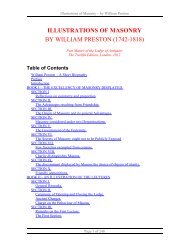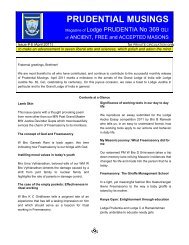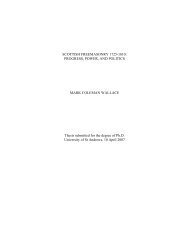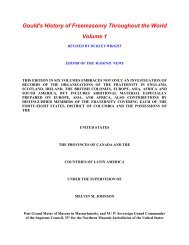The Origin of Freemasonry and Knights Templar ... - Lodge Prudentia
The Origin of Freemasonry and Knights Templar ... - Lodge Prudentia
The Origin of Freemasonry and Knights Templar ... - Lodge Prudentia
You also want an ePaper? Increase the reach of your titles
YUMPU automatically turns print PDFs into web optimized ePapers that Google loves.
SUPPLEMENTAL ENCYCLOPAEDIA<strong>of</strong> the hill <strong>of</strong> Zion for a considerable time after the conquest<strong>of</strong> Canaan, <strong>and</strong> even after the storming <strong>of</strong> Jerusalem, whilethe tribes<strong>of</strong> Judah <strong>and</strong> Benjamin occupied the lower city.<strong>The</strong>y were finally dispossessed byDavid. <strong>The</strong> name <strong>of</strong>Jerusalem is first mentioned in Josh. x. I. It lies uponthe original border <strong>of</strong> Judah <strong>and</strong> Benjamin, the line <strong>of</strong>which runs through the Valley <strong>of</strong> Hinnom, so that Zion<strong>and</strong> the northern city lay within the territory <strong>of</strong> Benjamin.Its historical importance dates from the time <strong>of</strong> David, whothere fixed his residence, calling it by the name <strong>of</strong> the"City <strong>of</strong> David," transporting to it the ark <strong>of</strong> the covenant.<strong>The</strong> building <strong>of</strong> the temple under Solomon was the consummation<strong>of</strong> the dignity <strong>and</strong> holiness <strong>of</strong> Jerusalem, whichwas further enlarged, strengthened, <strong>and</strong> beautified by thisking <strong>and</strong> his successors. It suffered a diminution <strong>of</strong> politicalimportance through the revolt <strong>and</strong> secession <strong>of</strong> the tentribes, from which date its history is identified with that<strong>of</strong> the kingdom <strong>of</strong> Judah. It was pillaged (971 B. C.) byShishak, King <strong>of</strong> Egypt by Joash, King <strong>of</strong> Israel ; ; <strong>and</strong>finally (588 B. C.) it was taken, after a siege <strong>of</strong> three years,by Nebuchadnezzar, who razed its walls <strong>and</strong> destroyedthe temple <strong>and</strong> palaces byfire. Having been rebuilt afterthe Captivity (536 B. C), it was again taken <strong>and</strong> pillagedunder Ptolemy Lagos (320 B. C), an Egyptian king, whocarried thous<strong>and</strong>s away slaves to Egypt. Antiochus IV.succeeded to the throne <strong>of</strong> Syria in 176 B. C. <strong>and</strong> deliberatelybegan to plan the extinguishment <strong>of</strong> the Jewish people.sent an army to Jerusalem, which entered on a Sabbathday (168 B. C.), made havoc <strong>of</strong> the inhabitants <strong>and</strong> leveledthe city walls. Pompey took the city (63 B. C), put 12,000<strong>of</strong> theHeinhabitants to the sword, <strong>and</strong> razed the walls to theground. A few years later (56 B. C.) it was pillaged byCrassus ; <strong>and</strong> from these beginnings date the continuedseries <strong>of</strong> Roman aggressions, which terminated in thecomplete destruction <strong>of</strong> the city <strong>and</strong> dispersion <strong>of</strong> the Jewishrace under Vespasian <strong>and</strong> Titus, A. D. 70.[82









